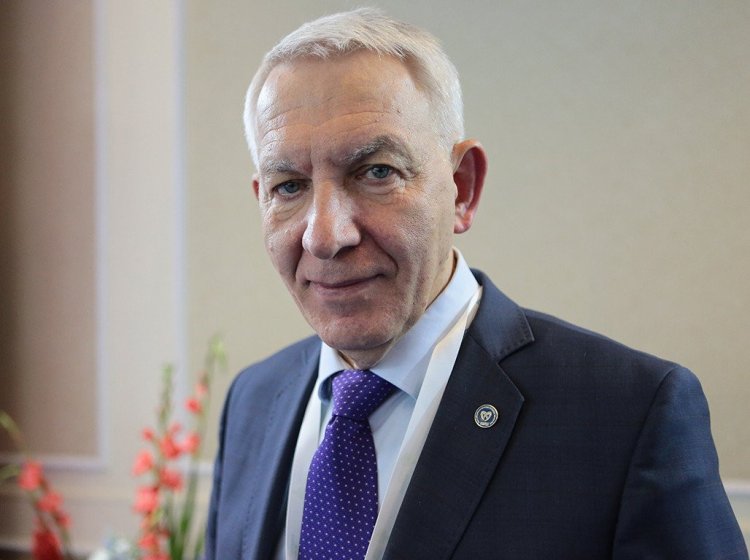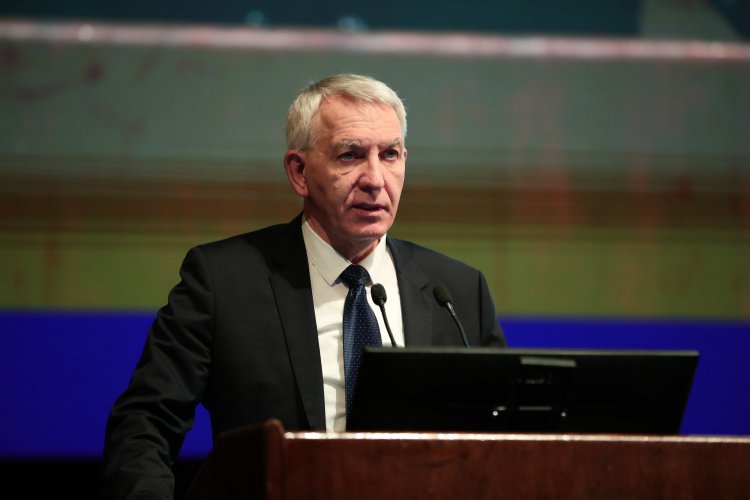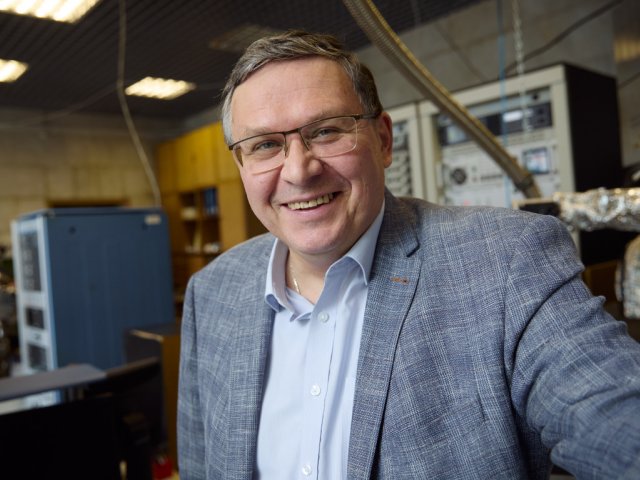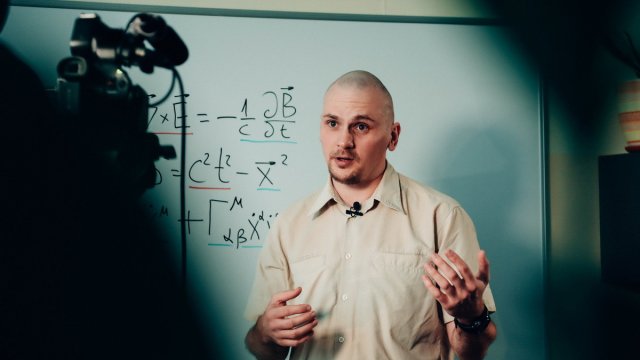In over two years of the COVID-19 pandemic, healthcare professionals and scientists have determined precisely that the novel coronavirus infection negatively affects patients with cardiovascular diseases.
Photo: Olga Merzlyakova / «Scientific Russia»
How do cardiovascular diseases affect COVID-19 severity? What challenges have cardiologists encountered during the pandemic? Why do patients with heart disease need to be vaccinated? Academician Evgeny Vladimirovich Shlyakhto, Director General of Almazov National Medical Research Center of the Ministry of Health of the Russian Federation, President of the Russian Society of Cardiology, chief visiting cardiologist of the Ministry of Health of Russia for the Northwestern, Southern, North Caucasian, and Volga federal districts, and chief visiting cardiologist of St. Petersburg Health Committee answers these questions.
— How does the relationship between COVID-19 infection and cardiovascular diseases manifest itself? What challenges have cardiologists encountered in the past two years?
— The COVID-19 pandemic has definitely become a serious test for our healthcare system in general and cardiology in particular. As we said at the beginning of 2020, the pandemic turned out to be a “black swan,” that is, an unpredictable event with negative consequences.
I would not say that there is a link between cardiovascular diseases and the novel coronavirus infection as if such patients are doomed to become ill with COVID-19. They rather form a risk group, in which coronavirus infection causes additional damage to the cardiovascular system and worsens or decompensates chronic cardiovascular diseases due to such factors as inflammation, infection, and fever.
The pandemic is associated with multiple negative factors: the very possibility of infection, limited access to specialized medical care and dispensary follow-up due to the repurposing of inpatient facilities and epidemiological restrictions as well as the need for treating this viral infection and its complications with drugs that can affect the cardiovascular system.
— Can COVID-19 cause new cardiovascular diseases?
— Any infection is a risk factor for cardiovascular diseases. COVID-19 is probably a stronger risk factor, as the mechanism of virus entry into cells is mediated by angiotensin-converting enzyme 2 (ACE2). This enzyme is a component of the renin-angiotensin-aldosterone system (RAAS) that regulates several cardiac and vascular functions. Being part of the viral entry mechanism, this enzyme inevitably activates many processes responsible for cellular inflammatory reactions, increased risk of thrombosis, and endothelial dysfunction.
As they say, the virus imposes a sentence, which is further enforced with the development of the pathological process.
— Are there cardiovascular diseases that produce a particularly strong effect on the severity of COVID-19?
— Arterial hypertension, ischemic heart disease, diabetes mellitus, and obesity predispose to severe COVID-19. We know that these patient populations are characterized by significantly higher risks of hospitalization, a severe course of coronavirus infection with the need for mechanical ventilation (MV), and increased risks of death.
People with vitamin D deficiency and senior patients also belong to the risk group.
— Do patients who had coronavirus infection exhibit changes in the cardiovascular system?
— We have a lot of data showing that coronavirus infection in and of itself can lead to various adverse consequences.
First of all, these are changes in the neurogenic control of blood vessels and the risk of persistent high blood pressure in such patients. We observe adverse effects associated with heart rhythm disturbances in patients who had coronavirus infection. Other adverse effects are symptoms of myocardial damage: these patients are characterized by elevated troponin, a marker of myocardial cell injury, and often develop myocardial fibrosis. All this can eventually lead to heart failure.
Long-term effects of COVID-19 can include pathological changes in the myocardium caused both by the virus itself and dysfunction of the defense mechanisms. The risk of delayed heart failure and rhythm disturbances are reasons for such patients to undergo an in-depth medical examination, including that for cardiovascular diseases. This in-depth examination also involves the assessment of inflammatory markers and the functional state of the heart. Echocardiography, examination of blood vessels, assessment of the probability of thrombosis, and diagnosis of thromboembolic complications can likewise take place.
Our government has developed an extended program of periodic health examination that includes not only lung function tests but also a thorough cardiovascular examination. We hope the program will be widely used.
— Amid the pandemic, there have been publications on the cardiotoxic effects of some antiviral drugs. Has it become a problem?
— Yes, it caused certain difficulties at first but they were not related to drugs, which are well investigated, but rather to their proper use in COVID-19 patients.
They started using some well-investigated drugs to treat COVID-19 patients. Those drugs had been used to treat rheumatic diseases for decades. Despite their positive effects, soon enough, the drugs were removed from clinical guidelines because in some cases, their use led to a higher mortality rate among patients with cardiovascular pathologies and myocardial damage.
At the same time, these medicines did not cause complications in COVID-19 patients without the symptoms of cardiovascular disease.
— Are there any effective treatment options left after removing the drugs that posed risks to heart patients from clinical guidelines?
— Any crisis is an opportunity for growth and innovation. COVID-19 is not an exception. In addition, I do not remember a situation in my life where science would respond to challenges and threats that promptly.
Vaccines were developed in Russia within several months. Of course, we already had the groundwork laid, that is, the Sputnik V vector platform. However, the scientists who created this vaccine so quickly are brilliant. It is one thing to have a platform but to launch a drug is quite another.
There is a new field related to mRNA vaccines. There appeared drugs against virus replication and multiple antibodies that calm cytokine storm and reduce viral load.
Today, we have whole groups of drugs that have proven effective against COVID-19. I am not an infectious disease doctor, but I have been involved in the treatment of various patient groups. I can say that I personally witnessed a dramatic change in a patient with fever caused by COVID-19 who almost fully recovered after a few hours of receiving modern antiviral therapy.
— Do existing Russian vaccines cause any complications or negative consequences in patients with cardiovascular diseases?
— No, it is substantiated with data that our vaccines do not cause negative effects in patients with cardiovascular diseases. On the contrary, these patients belong to a risk group and so they should be the first to get vaccinated.
We have information that a considerable number of patients with severe COVID-19 are hospitalized and put on life support. These patients are at a higher risk of adverse outcome specifically due to the fact they are not vaccinated.
— There is a special group of patients with cardiovascular diseases, that is, heart transplant patients. How has the COVID-19 pandemic affected their care?
— At Almazov National Medical Research Center, we deal with a lot of heart transplant patients. We have been performing this surgical procedure for more than a decade now, with 20-25 procedures per year.
All these patients receive follow-up care in our center. Of course, this period has brought serious challenges associated with how to manage these patients, how to use immunosuppressive therapy, and how to perform the vaccination. I must say, to our colleagues’ credit, we lost almost no one and all the patients are vaccinated.
Photo: Elena Librik / Scientific Russia
— Certain difficulties in the treatment of patients with cardiovascular diseases were associated with changes in patient routing and the repurposing of medical centers. I asked the same question to oncologists and tuberculosis doctors: should we expect a sharp increase in the advanced heart disease incidence rates?
— Yes, there is a risk of an increase in the number of heart failure patients.
To cope with this situation, special regulations were enforced to quickly restore periodic health examination activities and in-depth medical examinations for patients who had coronavirus infection. We acknowledge this risk.
We see a high concentration of markers of myocardial damage, elevated troponin T, and electrocardiography (ECG) changes in a relatively high share of patients even with moderate coronavirus infection. These are signals that these patients can develop myocardial damage, rhythm disturbances, and heart failure in the future.
— Did the increased cardiovascular disease burden coincide with the COVID-19 peak, or did heart problems manifest themselves later?
— We could see a direct correlation between high coronavirus incidence, inpatient facilities’ workload, and an increasing number of patients with cardiovascular disease. In St. Petersburg, almost all large hospitals except three inpatient facilities were partially or completely removed from the emergency care system that provides care to patients with somatic disorders, including cardiovascular disease.
The number of daily cases reached 25,000 people. No inpatient bed capacity is enough to hospitalize so many patients, especially patients with severe infections caused by the Delta variant.
— Have you noticed any difference in how the virus variants affect patients with cardiovascular diseases?
— Of course, the infection was more severe with the Delta variant. The risk of cardiovascular damage was significantly higher, and we used to encounter adverse outcomes more often. When the Omicron variant became dominant, the number of daily cases went up to 25,000 patients a day but the number of hospitalizations dropped significantly.
— What predictions do cardiologists make at the moment: what should we expect, except an increasing number of patients, and how should we deal with it?
— There is only one way out of this situation, that is, to take advantage of the reduction in COVID-19 incidence. In my opinion, this low infection rate will remain until fall.
We see increasing incidence rates in China, Germany, and South Korea. No one can say for sure how much time we have until the next wave; therefore, it is important to pay attention to revaccination. In fact, we achieved a very good share of vaccinated people at some point. Perhaps, the fact that the Omicron variant was accompanied by lower disease severity is associated with strong vaccine protection in patients.
Therefore, it is important to revaccinate up to 80% of the population by fall. In this case, we will be able to look into the coming 2022–2023 epidemic season with certain confidence and peace.
— What branches of science are actively developing today to help people with cardiovascular diseases?
— There are a lot of such branches in our field.
From the standpoint of prevention, these are polygenic risk scores. Whole genome sequencing allows obtaining information about genes that affect the synthesis of certain proteins regulating various systems and underpinning the development of these diseases. Therefore, they also influence drug dosages.
Fundamentally new drugs are launched, in particular, small interfering RNA (siRNA) drugs for the treatment of lipid metabolism disorders. The latest of these new drugs should be administered only twice a year meaning that patients do not have to take them every day.
New medicines for heart failure came to us from endocrinology; these are the so-called sodium-glucose cotransporter 2 inhibitors. In endocrinology, they are used to lower blood sugar. These drugs reduce the degree of fibrosis and restore blood circulation in patients.
There are a lot of research studies on genome editing technologies. I expect these technologies to be used in cardiology. There are very interesting findings showing that FAP receptor editing in fibroblasts decreases the degree of fibrosis. This process takes from two to three months. However, the resulting scars are different from those observed in the classic variant. This approach can reduce the heart failure incidence rate.
Genome editing technologies have also been adopted in xenotransplantation. The first pig-to-human heart transplantation was performed in January. Unfortunately, the patient did not live long. However, there are a lot of people with transplanted pig kidneys. The technology has been implemented and the problem of editing the immune defense and viruses existing in the pig heart is almost solved. Such surgeries can be a bridge to human organ transplantation for patients who are on the waiting list for donor organs.
There are many new approaches associated with the use of the potential of remaining cellular systems rather than of myocardium regeneration in and of itself. We received data on the use of stem cells for the treatment of heart failure at the end of the year. This is a great motivation for our colleagues who put their faith in cellular therapy.
Photo: Olga Merzlyakova, Elena Librik / Scientific Russia























